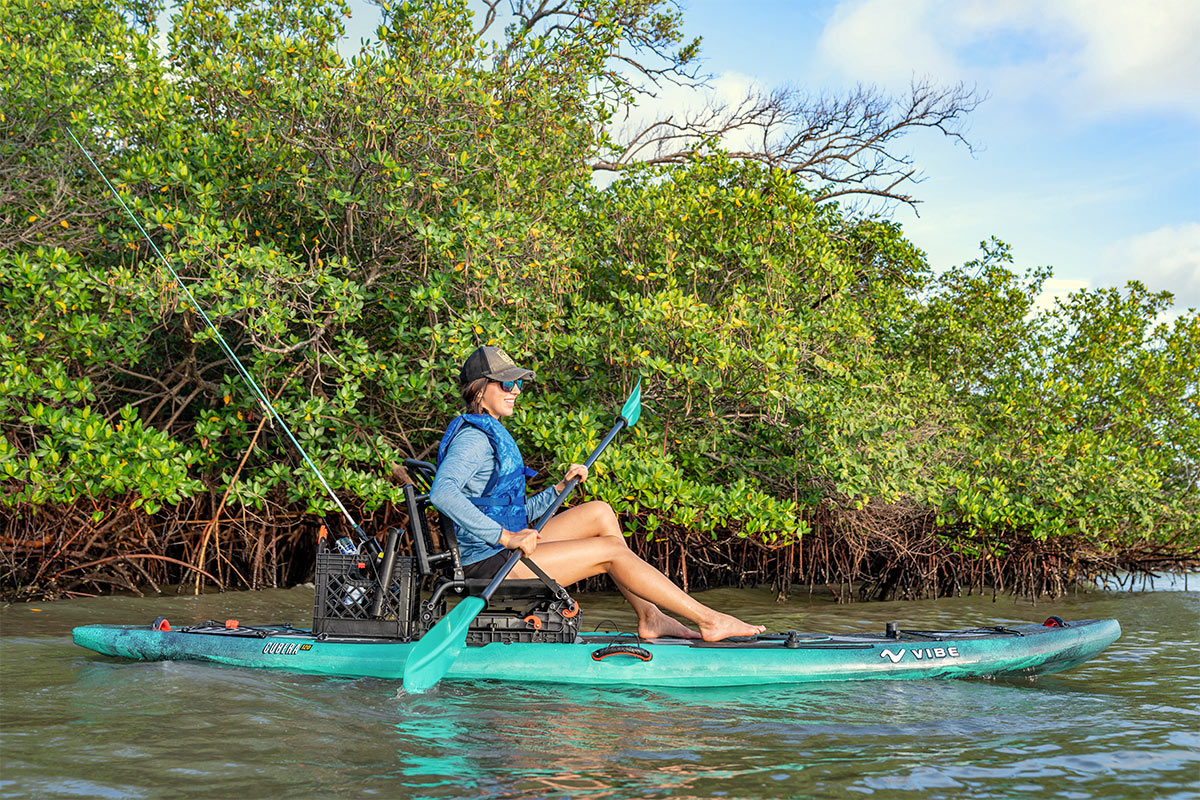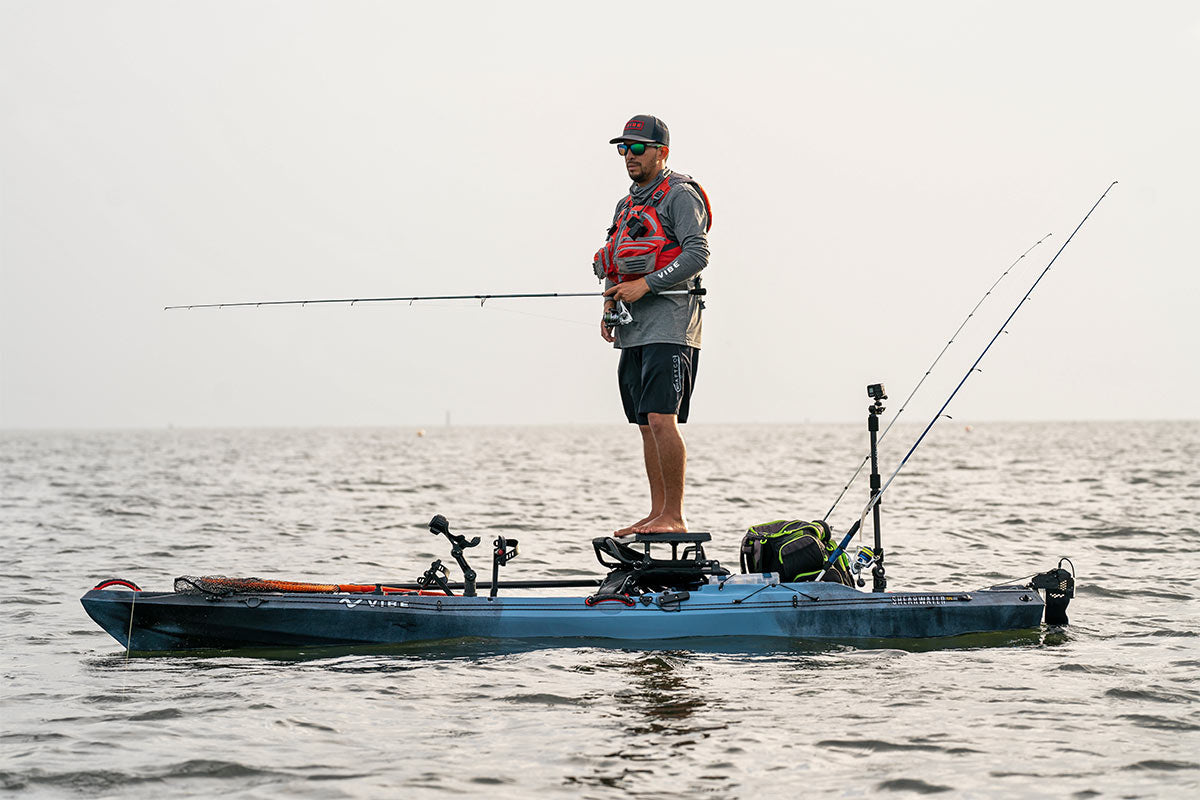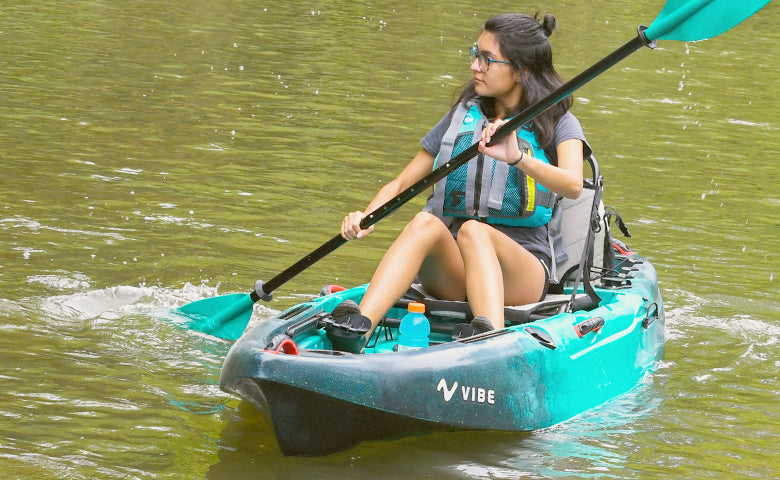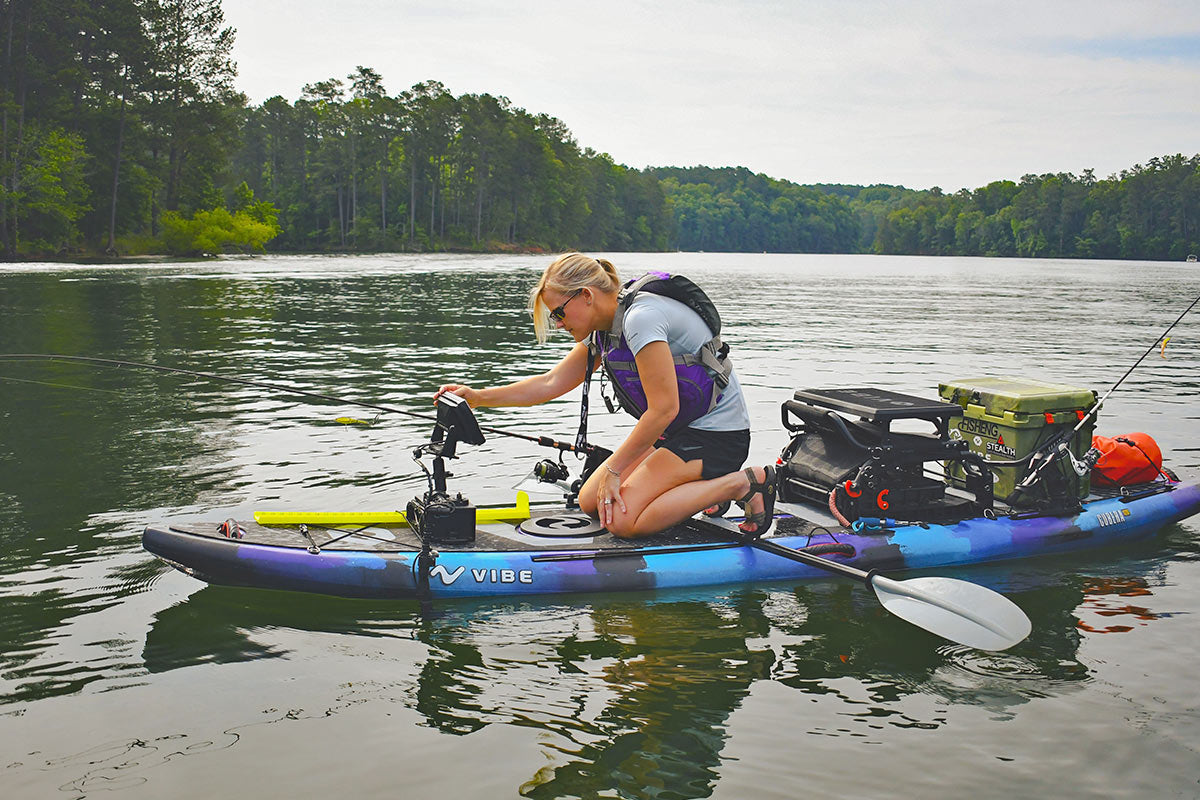How to Choose a Kayak vs SUP for Fishing

Stand up paddle boards (SUPs) offer a ton more open deck space than a traditional fishing kayak so you can more easily cast to anywhere on the water, and they can get to way more shallower waters than any kayak or motor boat. However, fishing kayaks have more bungeed storage space, and gear tracks for rod holders and accessories, and are easier to position on the water.
Lots of new and experienced anglers continue to debate "paddle board versus kayak" and the pros and cons of each vessel, but what are the differences? And is there an awesome middle ground? (Spoiler alert = There is, and it's called the Vibe Cubera 120! The best hybrid SUP fishing kayak on the market which can access inches-deep water or the deepest ocean bays.)
The biggest differences are whether you are seeking to really focus on finding and catching fish (and if you are looking to really up-your-game through pro angling technique 'sight fishing', which is where the Cubera 120 comes in), or whether you are seeking to do some fishing along with more recreational activities like paddle boarding.
Here we'll help you learn what advantages kayaks and paddle boards offer, to really help you find out which one is likely best for you.
The Basics: What’s a Fishing Kayak and What’s a SUP Board?
Both kayaks as well as stand up paddle boards (SUPs for short) have been used for a long time. They've both been used them for recreational activities on the water, but while fishing kayaks have been used by anglers for years, stand up paddle boards haven't generally been considered for fishing until fairly recently.
A SUP Board
SUP boards have been used for awhile for different types of leisure activities from recreational paddling to racing to yoga. Racing SUP boards have a displacement-style hull to cut through the water. Long-distance SUP boards are easier to paddle. Yoga SUP boards are tailored for yoga positions.
All SUP boards have a wide open deck which would make it perfect to cast from any angle at 360-degrees, but are not suited to most anglers because they have no way to secure loose gear and tackle from falling off, no way to add accessories like rod holders, don't have a place at the rear to mount an anchor pole or power-pole.
SUPs are also able to get to much, much shallower water than any kayak (spoiler: except the Cubera 120 – which can access the shallowest or deepest of waters), so SUPs can access very shallow shore areas where fish often hide.
A Fishing Kayak
Kayaks designed for fishing do have some specific and real advantages to a traditional SUP, and it's because they offer all of those things mentioned above that SUPs don't have. They not only have a seat, but have lots of storage for crates and tackle boxes, as well as gear tracks to add rod holders and Go Pro's and other accessories, and places to mount anchor poles and such. Some fishing kayaks like the Vibe Shearwater 125 even offer pedal power, keeping your hands free so you can focus on the fish.
The New Hybrid SUP Fishing Kayak – Cubera 120
The best of both worlds is the uniquely awesome hybrid fishing kayak SUP like the Vibe Cubera 120. It comes with the same open deck as a traditional stand up paddle board, but it also has a seat and secure storage, as well as gear tracks for rod holders, Go Pro's and more, plus tie-downs for a cooler or crate. It's more stable than a normal fishing kayak, with unrivaled room to move around as you fight your fish or cast in any direction.
The Cubera is also more stable than your average SUP, so that it's at home on ocean wakes or big lake white caps, or when bad weather comes in.
Advantages & Differences Between SUPs and Kayaks
So which is better?
The truth is, if you are looking to do real fishing, and are trying to decide between either a fishing kayak or a SUP, the very best choice is likely to be the one where you can have both a fishing kayak AND a SUP = the Vibe Cubera 120.
However, if you are locked into definitively doing either more fishing or more paddling, then deciding on a fishing kayak or a SUP is truly dependent on what you are most likely to being doing more of when you are on the water.
SUP Board Advantages
¬ Height: Standing up lets you sight fish better, increasing your chances of a hookup.
The biggest plus for stand up paddle board fishing is that you’re standing up. This lets you see way more than you do on a kayak. Sure, you can also stand up on a lot of fishing kayaks, but you’re not always standing up and sighting the fish like you are on a SUP.
¬ Weight: SUP boards are predominantly lighter. For most people, you'll never need two people to carry a SUP board.
¬ Easy to launch: No difficult maneuvering or positioning at all. Just drop them in the water and climb aboard.
¬ Great exercise: Using your entire body to move and balance gives you a full workout.
Kayak Advantages
¬ More customizable, plus you have storage options: You can carry a lot more gear on a kayak, and it won't fall off. You will always have more fishing options with a kayak.
¬ Easier To Navigate: You don’t need to be in good shape to use kayaks properly. Traditional SUPs require balance and a certain degree of athleticism. (Spoiler: The Cubera 120 lets you sit and paddle, so you have a choice of stand up paddling or seated paddling.)
¬ More stable: Kayaks can handle choppy water and don’t tip over as often as a SUP. (Spoiler: The Cubera 120 is more stable across its whole body than even a kayak in normal weather, and performs way better t=in bad weather than any traditional SUP.)
¬ Easier to paddle: Much less demanding to power them and to keep them steady.
¬ Access to more waters: Because kayaks are more stable and require less effort, you can use them in more places and conditions. SUP fishing is generally a no-go unless it’s a calm day. (Unless you have a Cubera 120.)
Paddle Board versus Fishing Kayak: Conclusions
SUPs and fishing kayaks both have their advantages.
There’s few things more liberating than heading out on an open board, and nothing more exhilarating than trying to keep steady while reeling in a monster.
Fishing kayaks are much more of a reliable all-rounder, offer a more relaxed paddle position and can get you places where a board just isn’t safe – as well as allow you to bring more equipment. (Again, unless you have the Cubera 120, and then that's the a fishing kayak / SUP swiss army knife.)
At the end of the day, it’s all down to how and where you want t



